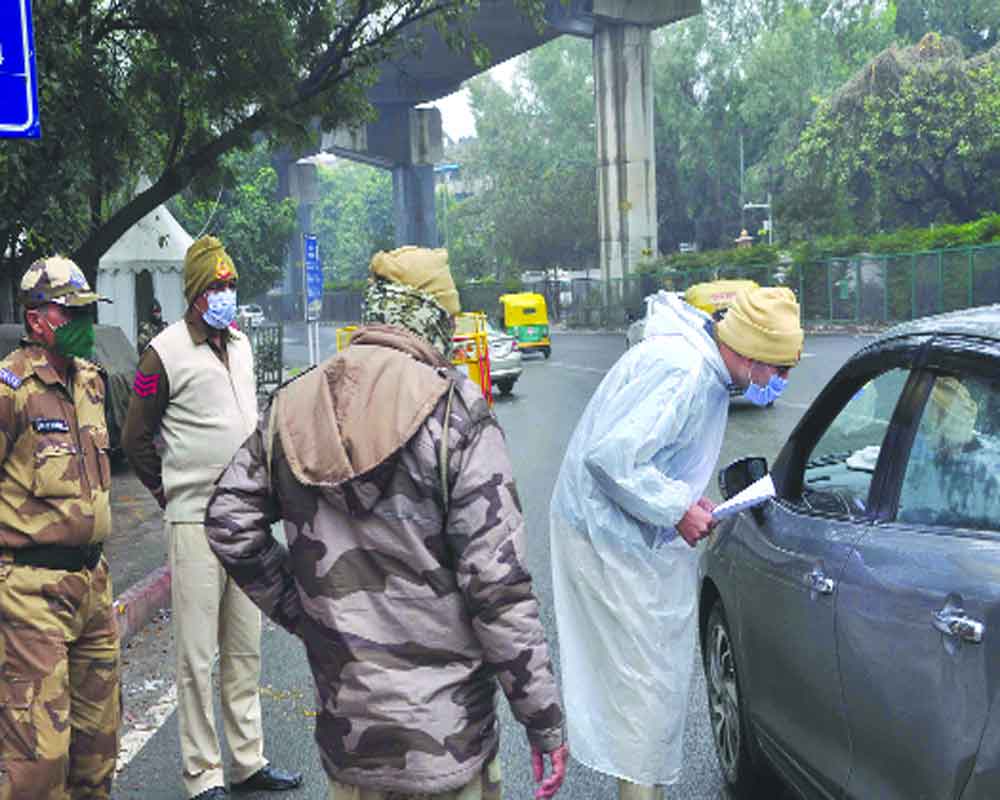On Sat, Delhi records 20,181 cases, 19% +vity; India 1.41 lakh, 3,071 Omicron cases
The march of Covid-19 infection slightly slowed down in Mumbai and Delhi during the last 24 hours on Saturday, but overall the situation seems as alarming as ever.
On Saturday 1,41,986 daily infections were reported, taking the country’s total caseload to 3,53,68,372, which included 3,071 Omicron variant.
Delhi on Saturday reported 20,181 fresh Covid cases, the highest single-day rise since May last year. The Capital reported 7 deaths over the last 24 hours. On Friday, Delhi reported 15,097 new cases. The test positivity rate stood at 19 per cent.
On the other hand, Mumbai on Saturday reported 20,318 cases in the last 24 hours, marginally lower than Friday’s 20,971. The city logged 5 Covid-related deaths. On the whole, Maharashtra added 41,434 new Covid cases, marginally higher compared to Friday. Thirteen people died in the last 24 hours in the State. Of the total cases, 82 per cent are asymptomatic, down from 84 per cent.
However, this is just the beginning, as indicated by a preliminary analysis by IIT Madras which has predicted the peak of the third wave between February 1 and 15.
They attributed this to India’s R-naught or R0 value which indicates the spread of Covid-19 was recorded at 4 this week, suggesting a very high infection transmission rate. R0 indicates the number of people an infected person can spread the disease to. A pandemic is considered to end if this value goes below 1.
Based on preliminary analysis by computational modeling done by IIT Madras, the R0 value was close to 2.9 nationally in the past week (December 25 to December 31). The number was recorded at 4 this week (January 1-6), according to a news agency.
Dr Jayant Jha, Assistant Professor, Department of Mathematics, IIT Madras, said R0 depends on three things — transmissibility probability, contact rate and the expected time interval in which infection can happen.
“Now, with the increase in quarantine measures or restrictions, maybe the contact rate will go down and then in that case R0 can decrease. So, based on our preliminary analysis, which is just based on the last two weeks, we can tell these numbers, but again, these numbers can change based on how much affirmative action is taken with respect to social gathering and all,” he said.
The Union Health Ministry on Wednesday said India is seeing an exponential rise in the number of coronavirus cases, which is believed to be driven by the Omicron variant. It also highlighted that the country’s R naught value is 2.69, higher than the 1.69 recorded during the peak of the pandemic’s second wave.
Among the southern States, Tamil Nadu reported 10,978 new cases, 1,525 recoveries, and 10 deaths, in the last 24 hours. Karnataka reported 8,906 fresh Covid cases, 508 discharges, and 4 deaths in the last 24 hours. At the same time, Kerala’s active Covid-19 cases reached 31,098 on Saturday after 5,944 more infections were reported during the last 24 hours.
Jha said the Ministry’s estimates are based on a different time interval than IIT Madras which has done the preliminary analysis from the past two weeks.
He further said as per their estimate, the peak in the current wave is expected to come between February 1-15 and it is expected to be sharper than earlier peaks.
“What we expect from the exploratory data analysis is that the peak will happen somewhere between February 1 and 15 and our analysis also shows that as compared to previous waves, there will be a sharper increase to the peak,” Jha said.
He said this wave will be different from the previous waves because of vaccination and factors like less social distancing seen this time.
Responding to how it is estimated that there is less social distancing in this wave, he said during the first wave many restrictions were imposed but right now despite having a high number of cases there are not many restrictions imposed yet.
“But the advantage here is that almost 50 per cent of the population this time has got vaccinated,” Jha added. With the administration of more than 90 lakh doses (90,59,360) vaccine doses in the last 24 hours, India’s Covid-19 vaccination coverage has exceeded 150.61 crore including 2 crore of those in the age group of 15-18 years who were started inoculating from January 3.
The preliminary analysis of the Covid surge has been done jointly by IIT Madras’ Department of Mathematics and Centre of Excellence for Computational Mathematics and Data Science headed by Prof Neelesh S Upadhye and Prof S Sundar.
In Delhi, in view of rising Covid-19 cases, the Kejriwal Government has added 5,650 normal beds and 2,075 ICU beds in 14 hospitals along with 2,800 beds in eight Covid care centers.
Health Minister Satyendar Jain said, “Around 13,300 beds are still available for patients in Delhi hospitals. Very few patients are getting admitted in this wave of corona, but we have made arrangements in hospitals to keep the situation under control in Delhi.”


























